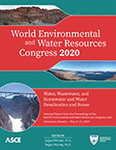World Environmental and Water Resources Congress 2020
Thermodynamic Evaluation of a Solar-Driven Adsorption Desalination Cooling Cycle
Publication: World Environmental and Water Resources Congress 2020: Water, Wastewater, and Stormwater and Water Desalination and Reuse
ABSTRACT
The growth of the world population increases the demand for fresh water for human consumption, agriculture, and industrial production. Current sources and their respective procurement and treatment processes are insufficient to meet this growing demand and approximately 40% of the world's population is already somehow under water stress. Of all available water on the planet 97% is salinized and only 2–3% is available for human consumption, so desalination processes are presented as an alternative to be considered to mitigate the effects of water scarcity. Current commercially used desalination processes are energy intensive from 3.5 to 12 kwh/m3 of potable water produced in addition to potential environmental risk due to the discharge of brine laden with pre and post-treatment chemicals. In the evaluation of available technologies, thermal adsorption desalination (AD) processes are arousing growing interest due to their ability to cogenerate double distilled water and cooling effect with lower energy consumption and lower environmental impact. This paper presents a model based on the theoretical adsorption cycles and analyses the correlations between thermodynamic and operational parameters and their influence on system performance. The configuration of the system studied consists of a single bed reactor adsorption system using thermally activated silica gel (ads) through thermal energy from solar collectors. The performance indicator parameters used were specific drinking water production (), (kJ/kg), and refrigeration effect (kJ/kg). With the simulation of the model the maximum values of water production per cycle 0.50 to 0.53 () were obtained with the inlet temperature of 80 to 95° C respectively and a cooling effect of 1,350 kJ / kg obtained at 90° C.
Get full access to this article
View all available purchase options and get full access to this chapter.
REFERENCES
Ng, K. C., H. T. Chua, C. Y. Chung, C. H. Loke, T. Kashiwagi, A. Akisawa, and B. B. Saha. 2001. “Experimental Investigation of the Silica Gel-Water Adsorption Isotherm Characteristics.” Applied Thermal Engineering 21(16):1631–42.
Ng, Kim Choon, Kyaw Thu, Youngdeuk Kim, Anutosh Chakraborty, and Gary Amy. 2013. “Adsorption Desalination: An Emerging Low-Cost Thermal Desalination Method.” Desalination 308: 161–79.
Ng, Kim Choon, Kyaw Thu, Bidyut Baran Saha, and Anutosh Chakraborty. 2012. “Study on a Waste Heat-Driven Adsorption Cooling Cum Desalination Cycle.” International Journal of Refrigeration 35(3):685–93.
Olkis, C., S. Brandani, and G. Santori. 2019. “Cycle and Performance Analysis of a Small-Scale Adsorption Heat Transformer for Desalination and Cooling Applications.” Chemical Engineering Journal 378(April):122104.
Raj, Rahul and V. Baiju. 2019. “Thermodynamic Analysis of a Solar Powered Adsorption Cooling and Desalination System.” Energy Procedia 158: 885–91.
Thu, Kyaw, Kim Choon Ng, Bidyut, B. Saha, Anutosh Chakraborty, and Shigeru, Koyama. 2009. “Operational Strategy of Adsorption Desalination Systems.” International Journal of Heat and Mass Transfer 52(7–8): 1811–16.
Thu, Kyaw, Bidyut Baran Saha, Anutosh Chakraborty, Won Gee Chun, and Kim Choon Ng. 2011. “Study on an Advanced Adsorption Desalination Cycle with Evaporator-Condenser Heat Recovery Circuit.” International Journal of Heat and Mass Transfer 54(1–3): 43–51.
Wang, Xiaolin and Kim Choon Ng. 2005. “Experimental Investigation of an Adsorption Desalination Plant Using Low-Temperature Waste Heat.” Applied Thermal Engineering 25(17–18): 2780–89.
Wu, Jun W., Eric J. Hu, and Mark J. Biggs. 2012. “Thermodynamic Cycles of Adsorption Desalination System.” Applied Energy 90(1):316–22.
Information & Authors
Information
Published In
World Environmental and Water Resources Congress 2020: Water, Wastewater, and Stormwater and Water Desalination and Reuse
Pages: 42 - 51
Editors: Sajjad Ahmad, Ph.D., and Regan Murray, Ph.D.
ISBN (Online): 978-0-7844-8298-8
Copyright
© 2020 American Society of Civil Engineers.
History
Published online: May 14, 2020
Published in print: May 14, 2020
Authors
Metrics & Citations
Metrics
Citations
Download citation
If you have the appropriate software installed, you can download article citation data to the citation manager of your choice. Simply select your manager software from the list below and click Download.
